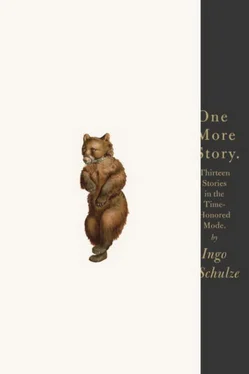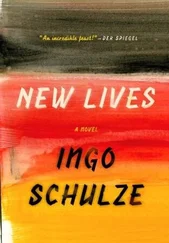Tanya and I took our lunch and dinner in restaurants that were both upscale and empty, and despite a good number of beers we seldom paid more than twenty marks.
When we and a small group went looking for a restaurant after the reading, it was Tanya and I who could offer suggestions. My translator, on the other hand — who told us how she and the people of Tallinn, of the entire Baltic, had for so many years gathered to sing anthems in hope of independence — couldn’t recall the last time she’d been in a restaurant. She couldn’t imagine buying a book as expensive as mine — which converted at just short of seventeen marks.
Before I tell about our days in Käsmu I want to mention another episode that has nothing to do with my story, really. Between a reading for students in the German Department of Tartu University and the public reading that same evening of the translated version of my book, some students invited Tanya and me for a walk through town. Toward the end of our little tour we passed a kiosk that offered the same beverages we have at home. There were two wooden benches out in front, and we invited the students to join us for a drink. Tanya said she was amazed at how everyone here roundly cursed the Russians but almost revered the Germans. Was that simply a matter of hospitality?
That had nothing to do with hospitality, it was simply how they felt, after all they were German majors. I was about to ask a question myself, when the youngest and loveliest of the female students, who until this point had only listened, exclaimed, “Why are you amazed? Germans have never harmed Estonians.”
“Well maybe not Estonians—” Tanya said.
“I know what you’re getting at,” the student interrupted. “But surely you know that we Estonians had our own SS, and you only have to consider how many Estonians, how many people from the Baltic in general, the Russians killed and deported even after the war. Only bad things have come from Russia, and mostly good things from the Germans — people can’t help noticing that.”
Tanya said that one cannot limit memory to a particular span of years or to a single nationality, and that after all it had been the Hitler-Stalin pact that had robbed them of their sovereignty.
“That’s true, of course it’s true,” the student said. “But why are you amazed?”
“Why aren’t you amazed!” Tanya blurted out. After that we returned to the university and exchanged addresses.
On the drive to Käsmu in our rental car, Tanya asked me if she had come off as self-righteous. No, I said, just the opposite, but unfortunately I hadn’t been able to come up with anything better to say. Tanya said she couldn’t help being reminded of certain turns of phrase in those Estonian fairy tales we had been reading aloud to each other of an evening. Certain idioms kept popping up, like “She adorned herself in beautiful raiment, as if she were the proudest German child,” or “as happy as a pampered German child.”
We were looking forward to Käsmu. We had read in our guidebook that Lahemaa, Land of Bays, lies about twenty-five miles to the east of Tallinn, is bounded by the Gulf of Finland and the Tallinn-Narva highway, encompasses an area of 250 square miles, and was declared a national park in 1971. The guidebook also noted several endangered species to be found there: brown bears, lynx, mink, sea eagles, cranes, Arctic loons, mute swans, and even black storks.
We reported in to Arne, a gangly man with medium long hair and a beret, who runs a kind of marine museum. He greeted Tanya and me with a handshake: a signal, he said, to his two dogs — setters — that we now belonged to the village. Before handing over the keys, he gave a brief lecture about the especially favorable magnetic field of Käsmu. On the way to the guesthouse, however, Arne fell silent, as if to allow us to take in the view of tidy frame houses without any distraction and appreciate the peaceful setting to the full. The two setters bounded ahead of us, came back, circled us, and nudged against our knees.
When I think back on that week now, six years later, the first thing that comes to mind — quite apart from the incredible events I am about to recount — is the way the light turned every color brighter and paler at the same time.
The house had once belonged to Captain Christian Steen, who had been deported to Siberia in 1947 and has since been listed as missing. The entryway opened on a large, centrally located dining room, where, with one exception, we took all our meals alone at the huge table. At opposite ends of this space were the two guest rooms, and a third door led to the kitchen, which adjoined a winter garden. The dining room’s high windows looked directly out onto the sauna cabin and a moss-covered erratic deposited by the last ice age.
The finest quarters, the Epos Room, had been reserved for Tanya and me. The smaller Novel Room was unoccupied at first, while the two Novella Chambers under the roof were home to a married couple, both lyric poets. We, however, caught sight only of the wife, who, no sooner had she announced in English, “Käsmu is good for work and good for holiday,” scurried off again as if not to waste one second of her precious Käsmu sojourn.
Käsmu has a narrow beach. You walk through the woods, and suddenly there is the sea. Or you stroll out on the pier in the little harbor to watch children fishing and let your fantasy run free as you gaze at derelict cutters scraping garlands of car tires strung along on the sides of the pier. The town is nothing spectacular, but lovely for that very reason. Somewhere there must be a depot for wooden pallets, because pallets lie about everywhere, and once they have been chopped into firewood by the villagers, are stacked along the sides of their houses.
The one thing we had a knack for in Käsmu was sleeping. Käsmu is worth a trip simply for its silence. As we sat in the winter garden in the evening — sipping tea, eating the wild-berry marmalade we’d bought from an old local woman, listening to the sea and the birds — time seemed to stand still.
Käsmu’s peace and quiet were only disrupted of a morning, by two or three buses that came lumbering down the village street to deposit school classes at Arne’s museum. The children stood staring in amazement at whalebones, shark teeth, ships in bottles, fishhooks, and postcards of lighthouses around the world. They would picnic on the lawn in front of the building, run out on the pier, and then be driven away again.
Tanya and I had tried to engage Arne in conversation and intended to invite him to dinner, but Arne resisted all contact with us. Even when we paid a second visit to his museum, he simply greeted us with a brief nod and then shuffled away.
On the third day — it had been drizzling since early morning — we watched from the window of our Epos Room as schoolchildren got off their buses, jiggled at Arne’s front door, circled the building, peered in from the veranda, until finally their teachers, equally perplexed and upset, rounded them up and herded them back onto the buses, where we could see them eating their picnic lunch. That evening when we returned from our excursion to the high marshy moorland, the note we had left for Arne asking him to heat the sauna was still wedged in his door. The sky was clear and promised a beautiful sunset.
The fourth day was cold and so gusty we could hear the sea even with the windows shut, and we stayed indoors. Tanya made tea and crawled back into bed with Gustav Herling’s A World Apart . Resolved at last to make use of Käsmu’s favorable aura and do some work, I turned on my laptop and was staring at the file icons on my screen — when savage barking called us to the window.
A green Barkas van was standing beside the museum. Arne’s setters were going crazy. I don’t know where they had suddenly come from, but their baying didn’t sound exactly welcoming. Although the day before yesterday these same dogs had obeyed Arne’s every word, he now had to grab each by the nape of its neck and drag it into the house. But once inside they still didn’t calm down and kept leaping up at the windows to the veranda, yelping their hearts out.
Читать дальше












